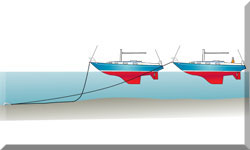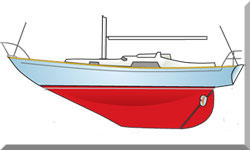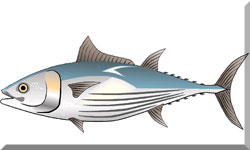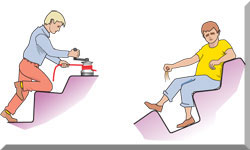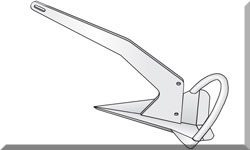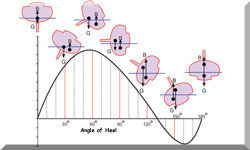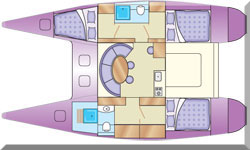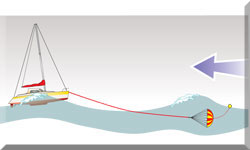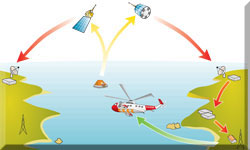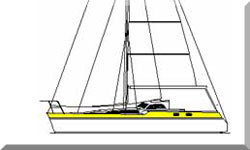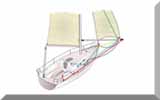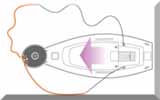- Home
- Electronics & Instrumentation
- Marine EPIRB
A Marine EPIRB for Sea Safety and Survival
If you find yourself in dire straits in mid-ocean, a marine EPIRP can be a big help in getting you out of it. Used incorrectly though, one of these electronic devices can have the opposite effect, as this cautionary tale relates...
Some years ago were having a lunchtime beer in the yacht club bar with some pals, having taken a break from working on our boats.
We were building our wood-epoxy cutter Alacazam for long distance cruising and they were fitting out their Rival 38 for an Atlantic crossing. The topic of sea safety and survival arose...
One of their recent purchases, they told us, was an EPIRB.
I remember we were having to speak very loudly to make ourselves heard over the clatter of a helicopter hovering nearby.
We thought nothing of it at the time - after all this was Holes Bay in Poole Harbour, close to the home of the Royal Marines who were frequently charging around in choppers and fast landing craft - so we weren't too surprised by the presence of the helicopter.
But later that day our pals had a visit from Her Majesty's Coastguard...
"What, exactly, was the nature of your distress?" asked the Coastguard Officer.
The EPIRB beacon, still in one of the holdalls they had unpacked from their car and heaved aboard, had activated as a result of the rough treatment; hence the helicopter...
Protestations of innocence fell on deaf ears. The Coastguard Officer firmly but courteously explained that they could find themselves on the wrong end of a large fine - and confiscated their EPIRB to boot!
What Is A Marine EPIRB & How Does It Work?
The EPIRB system, or Electronic Position Indicating Radio Beacon system to give it its full name, is a sub-system of the Global Maritime Distress and Safety System (GMDSS).
There are broadly two types of beacons to be aware of:
The 406MHz Marine EPIRB
These are the workhorses for serious offshore safety, intrinsically linked to your specific vessel. This crucial link allows rescue agencies to instantly access a database containing your boat's emergency information.
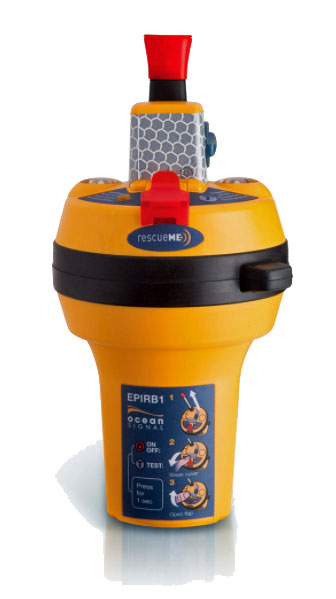 A 406MHz Marine EPIRB
A 406MHz Marine EPIRBWhen your EPIRB transmits that distinctive 406MHz signal, it's not just a generic distress call; rescuers know exactly who you are and can quickly reference your registered details, including those all-important emergency contacts, to verify your intended passage and any other relevant information.
It's worth noting that within this category, you'll find different activation mechanisms. Category 1 EPIRBs often come equipped with a hydrostatic release unit (HRU). Think of this as an automatic activation trigger, designed to deploy and activate the EPIRB if your vessel sinks to a depth of around 1.5 to 4 meters. This is a critical feature should a rapid capsize or sinking prevent manual activation.
However, these HRUs have expiry dates, so regular checks and timely replacements, as per the manufacturer's recommendations, are essential. Proper mounting is equally important for Category 1 units; they need a clear path to float freely to the surface should the worst happen.
Then there are Category 2 EPIRBs, which rely on manual activation. While lacking the automatic release of their Category 1 counterparts, they can serve as a reliable option, perhaps as a backup or for certain types of vessels where manual control over activation is preferred.
Personal Locator Beacons (PLBs)
These offer a more versatile solution, not exclusively for marine use.
Hikers, kayakers, backpackers, climbers, pilots, river rafters, and even hunters find them invaluable.
For us cruisers, a PLB can be excellent insurance when venturing away from the mothership in your dinghy or as a less-bulky EPIRB alternative for smaller craft where space and weight are critical considerations.
The Marine EPIRB System in Operation...
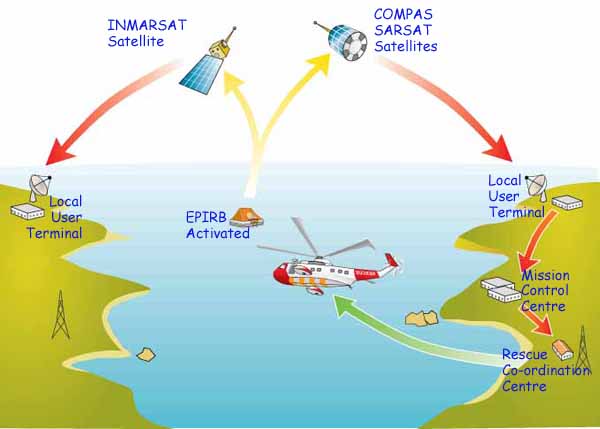 The communication channels of the marine EPIRB system
The communication channels of the marine EPIRB systemArtwork by Andrew Simpson
the primary function of the EPIRB is to alert search and rescue services the moment an emergency occurs. It achieves this by transmitting a coded message on that dedicated 406MHz distress frequency. This signal is then relayed via the COSPAS-SARSAT polar orbiting satellite network – a system providing true global coverage – and onward to ground-based earth stations, ultimately reaching the nearest rescue coordination centre.
These marine EPIRBs leverage the COSPAS-SARSAT system's capability to determine the transmitting beacon's position through triangulation, achieving an accuracy of within 3 nautical miles. Impressively, if your unit is fitted with a built-in GPS (Global Positioning System), this accuracy can be dramatically improved, often pinpointing your location to within just a few meters.
Many units also include a secondary distress transmitter operating on the older 121.5MHz frequency. This "homer" signal, while having a shorter range and not being satellite-based, is primarily used by search aircraft to home in on your precise location once they are in the general vicinity.
When you first acquire a marine EPIRB, the registration process with HM Coastguard is a critical step. This registration creates a unique 15-digit hexadecimal beacon identification code – the HEX ID. This code is your beacon's digital fingerprint and is linked in the database to vital information, including:
- phone numbers to call in the event of an emergency, ie next of kin;
- a description of the vessel;
- the home port of the vessel;
- any additional information that may be useful to Search & Rescue agencies.
It's absolutely vital to keep this registration information up-to-date. If your contact details change, you acquire a new vessel, or any other registered information becomes outdated, you need to update your registration immediately through the official channels. Think of it – this information is what rescuers will rely on in a critical situation.
The distress message transmitted by the EPIRB contains information such as:
- which country the beacon is from;
- the HEX ID of the beacon;
- The encoded identification of the specific vessel in distress;
- If the unit has a built-in GPS, the precise latitude and longitude of the casualty;
- An indication of whether or not the beacon is equipped with a 121.5MHz "homer" signal.
Given that marine EPIRBs are radio transmitters, it's essential to remember that they must be included on your vessel's radio license.
Beyond the basics, there are further technical and practical aspects to consider. The transmission power of your EPIRB, for instance, directly influences the range of its signal. Frequency stability ensures that the signal is accurately received by the satellites. Even the antenna design and performance play a critical role in signal propagation.
The EPIRB needs a moment to acquire a GPS fix, which can take a little longer if it's been stowed below deck. Also, while generally reliable, GPS technology isn't infallible. Understanding these nuances helps in appreciating the system's capabilities.
Most EPIRBs also have a secondary distress transmitter operating on the older 121.5MHz frequency, used for homing purposes. This dual-frequency approach increases the chances of detection, especially in challenging environments.
But the 121.5 MHz homing signal, while a useful secondary aid, has a significantly shorter range than the 406 MHz signal and isn't monitored by the satellite network. Its primary purpose is to guide search aircraft in the final stages of a rescue.
Proper maintenance is key to ensuring your EPIRB functions flawlessly when needed. Regular visual inspections for any signs of damage, ensuring the antenna is secure, and periodically performing the self-test function are crucial habits to cultivate. Understanding the results of these self-tests is important; they primarily confirm the internal electronics are functioning but don't represent a full operational check. For comprehensive assurance, adhere to the manufacturer's recommended professional servicing schedules. Knowing where to find authorized service centres is also vital for proper upkeep.
We should also be mindful of false alarms. Accidental activation, improper storage, or even an aging HRU can trigger them. Familiarize yourself with the procedures for cancelling a false alarm by immediately contacting the relevant coastguard or maritime authority via VHF radio or phone.
Finally, as technology advances, keep an eye on any future developments or changes within the COSPAS-SARSAT system that might influence EPIRB technology. And when it's time to retire an old unit, remember to dispose of it responsibly, paying particular attention to the battery (it typically lasts between 5 and 10 years) which should be handled according to local regulations or returned to the manufacturer.
Got any EPIRB-related questions that haven't been addressed in this article? You're almost certain to find the answers here...
Recent Articles
-
Modern Boat Electronics and the Latest Marine Instruments
Dec 20, 25 05:27 PM
Should sailboat instruments be linked to the latest boat electronics as a fully integrated system, or is it best to leave them as independent units? -
Hans Christian 43: Classic Bluewater Cruiser & Liveaboard Sailboat
Dec 10, 25 04:37 AM
Explore the Hans Christian 43: a legendary heavy-displacement, long-keel sailboat. Read our in-depth review of its specs, design ratios, and suitability for offshore cruising and living aboard. -
Planning Your Sailboat Liveaboard Lifestyle: An Ocean Sailor's Guide
Dec 06, 25 05:18 AM
Seasoned sailors share their methodical risk analysis for planning a secure Sailboat Liveaboard Lifestyle, covering financial, property, and relationship risks.

